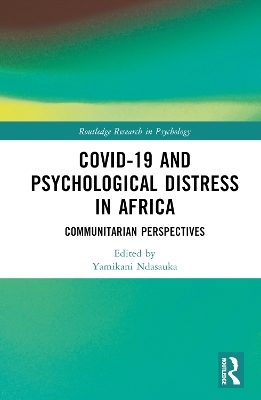
COVID-19 and Psychological Distress in Africa
Routledge (Verlag)
978-1-032-54630-8 (ISBN)
This timely book draws on unique African experiences to explore the intersection between mental health and African communitarianism in the context of COVID-19, giving voice to the perspectives of vulnerable populations facing pre-existing challenges such as depression, anxiety, and stress.
Advancing knowledge and contributing to the global debate about the effects of the pandemic on the psychological well-being of African people, chapters critique the role of media, information, misinformation, and disinformation during this period on individual- and community-based mental health. Using a holistic approach, the book highlights the need to prioritise the localising of mental health systems and clinical services to provide a better standard of care and comprehensive, context-specific mental health interventions that consider the heterogeneity within and between African regions. The book demonstrates through nuanced evidence and analysis that communitarian perspectives allow African societies to balance collective solidarity with individual well-being to benefit overall mental health.
Ultimately drawing on communal values and localised knowledge to cultivate resilience to fight the psychosocial impacts of COVID-19 in Africa, the book will be of interest to scholars, postgraduate students and researchers exploring psychology, philosophy of mental health, and public health policy more broadly, as well as and cultural studies and the sociology of pandemics.
The Open Access version of this book, available at www.taylorfrancis.com, has been made available under a Creative Commons Attribution-Non Commercial-No Derivatives (CC-BY-NC-ND) 4.0 license.
Yamikani Ndasauka is Associate Professor in Department of Philosophy, University of Malawi, Malawi.
Chapter 1
Covid-19 and Mental Health in Africa: A Communitarian Perspective
Part 1: The Heightened Burdens of COVID-19
Chapter 2
Complex and Multifaceted Sociodemographic Depression Correlates in Malawi During COVID-19
Chapter 3
Challenging Notions of Heightened Female Disadvantage During COVID-19
Chapter 4
COVID-19 Crisis Communication, Infodemics and Psychological Distress Among Sub-Saharan African Youth
Chapter 5
Academic Staff Coping Responses to COVID-19 Disruptions in Universities
Chapter 6
Experiences of Media Workers During the COVID-19 Crisis
Part 2: Setting the COVID-19 Narrative
Chapter 7
Unintended Mental Health Consequences of Media Framing During COVID-19
Chapter 8
COVID-19 and Anxiety Constructions in African Poetry
Chapter 9
Psychological Toll of COVID-19 Communication Patterns in Malawi
Part 3: From Confusion to Anxiety
Chapter 10
Proliferation and Impacts of Health Misinformation on Social Media During COVID-19 in Kenya
Chapter 11
African Hybridity, Information, and Psychological Distress During COVID-19
Chapter 12
Utilitarian Perspectives on Curbing Online Abuse of African Women During the COVID-19 Crisis
Chapter 13
Intersections Among Vaccine Hesitancy, Mental Health, and COVID-19
Part 4: Digital Remedies or Poisons?
Chapter 14
Health Worker Experiences of Using Digital Resources for the Improvement of Mental Well-Being
Chapter 15
Online COVID-19 Discourse and Mental Health Impacts in Malawi
Chapter 16
The Complex Interplay of Technology and Mental Health During COVID-19
Chapter 17
Re-focusing African Mental Healthcare Readiness for Future Pandemics
| Erscheinungsdatum | 11.01.2024 |
|---|---|
| Reihe/Serie | Routledge Research in Psychology |
| Verlagsort | London |
| Sprache | englisch |
| Maße | 156 x 234 mm |
| Gewicht | 662 g |
| Themenwelt | Geisteswissenschaften ► Philosophie |
| Geisteswissenschaften ► Psychologie ► Psychoanalyse / Tiefenpsychologie | |
| Geisteswissenschaften ► Psychologie ► Sozialpsychologie | |
| Medizin / Pharmazie | |
| Sozialwissenschaften ► Soziologie ► Spezielle Soziologien | |
| ISBN-10 | 1-032-54630-1 / 1032546301 |
| ISBN-13 | 978-1-032-54630-8 / 9781032546308 |
| Zustand | Neuware |
| Haben Sie eine Frage zum Produkt? |
aus dem Bereich


